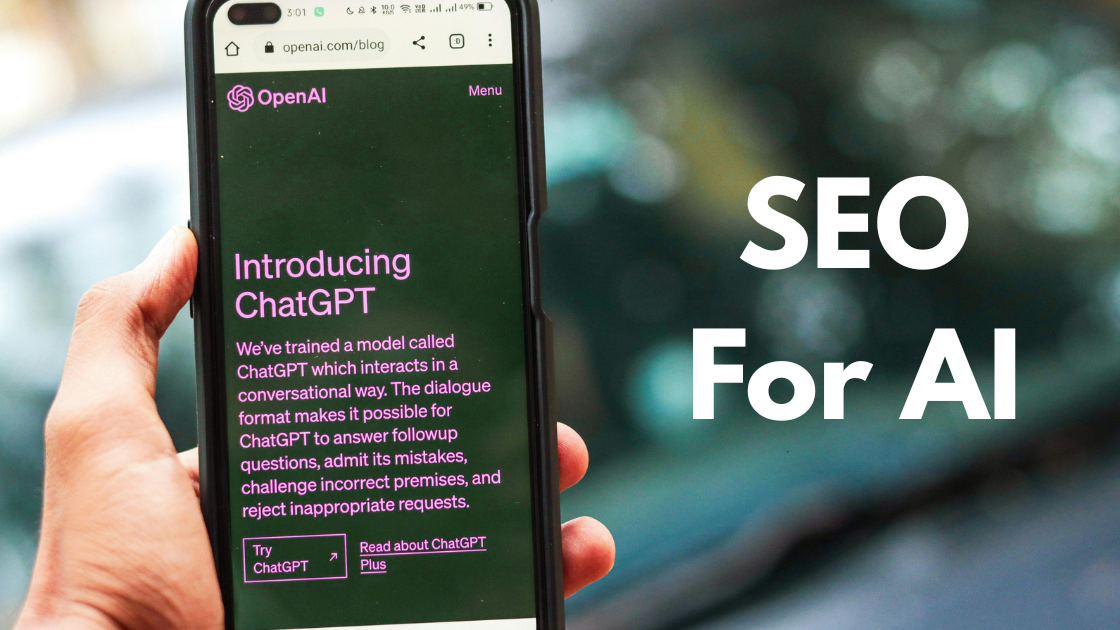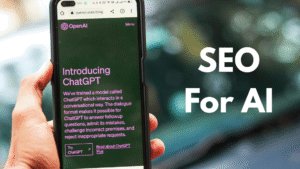In today’s digital landscape, the phrase “SEO for AI” isn’t optional, it’s essential.
As large language models (LLMs) like ChatGPT, Google Gemini and Claude increasingly participate in how users discover content, your optimisation strategy must evolve.
This blog will unpack what SEO for AI means, why it matters in 2026, and how you can adapt your content and site so that AI models not only understand you but recommend you.

What is SEO for AI?
“SEO for AI” refers to optimising your site and content so that LLMs can read, interpret, trust, and surface it in their outputs.
In traditional SEO you focus on keywords, backlinks, and ranking positions.
With SEO for AI you’re also aiming to show up in AI-driven queries, interactive assistants, and generative outputs. For example, one industry article explains:
“LLM SEO is the process of optimizing your content so that large language models can understand, interpret and surface it in their responses.” Neil Patel
Another piece observes that:
“LLMs don’t ‘crawl’ websites like traditional search engines do. Instead, they generate responses based on pre-trained data, considering word frequency, contextual relevance, and surrounding content.” Search Engine Land
So when we talk about SEO for AI, we’re saying: create content and a site design that speak the language of LLMs: clarity, context, structure, entity-trust.

Why SEO for AI matters in 2026
1. Visibility is shifting from clicks to citations
Because many users are getting direct answers from LLMs or AI-augmented search results (no click required), your content may be seen without being clicked. That means if you only optimise for clicks, you could miss the new frontier. For example, one resource states that LLMs prioritise being cited or summarised rather than just ranking. M8L
2. Brands that signal authority win the trust game
SEO for AI emphasises credibility: structure, clarity, authoritativeness. Brands whose content is well-written, clearly laid out, and semantically rich are more likely to appear in AI-driven answers. Neil Patel
3. Traditional SEO is not enough (but still needed)
Optimising for AI doesn’t mean abandoning traditional SEO; rather, you layer it on. For instance:
“LLM SEO builds on traditional SEO. You still need a strong technical and content foundation.” Neil Patel
4. Early-movers get advantage
As search behaviour shifts more toward conversational and AI formats, brands that adapt now will capture attention that others won’t. One blog said:
“Optimizing for LLMs is not just a trend—it’s a shift in how content gets discovered.” BIT Quirky Consulting

How to implement SEO for AI: A 6-step framework
Here’s how to adapt your content strategy so you speak the language of LLMs and win their recommendation.
Step 1: Choose topics aligned with conversational queries
Think like the user and the AI assistant. What question might they ask?
For example: “How does generative AI affect my website’s visibility?” or “What’s the best way to structure content for ChatGPT to reference it?”
Using natural, human-first language is key. Many sources emphasise that LLMs favour question-and-answer, direct language. gtechme.com+1
Step 2: Structure content clearly
Headings, sub-headings, lists, FAQs — these help LLMs parse your content. According to one article:
“LLMs ingest and parse content based on: literal surface-level term matching, structural formatting cues like headings, lists, and bullet points.” Yoast
So make each section answer one idea. Use clear headings like: “What is SEO for AI?”, “Why it matters”, “How to do it”.
Step 3: Use semantic and conversational keywords
Rather than focusing on one rigid keyword, include semantic terms and synonyms. For example: “AI search optimisation”, “LLM visibility”, “generative engine optimisation (GEO)”. One guide says:
“Keyword-stuffing actually reduces LLM visibility (-10% vs no-op).” Penfriend.ai+1
So your focus keyword — “SEO for AI” — should be used naturally. Also include related phrases like “LLM SEO”, “AI search optimisation”, “generative engine optimisation”.
Step 4: Build credibility and entity signals
LLMs look not just at the content but the source and brand signals. Include author names, publication dates, cite reputable sources. Use schema markup to mark up your article, author, organisation. One article points out:
“LLMs prioritise brand mentions, contextual relevance, and entity associations.” Search Engine Land
Step 5: Optimise your site technically
Site speed, mobile readiness, structured data, clear URL structure matter. If the AI crawler cannot access it cleanly, your chance drops. Use schema like Article, FAQ, Organisation. One source states schema helps though content structure is key. Yoast+1
Step 6: Measure and iterate differently
Because you may not always track clicks, combine traditional metrics with new ones: mentions in AI tools, citations from AI search results, referral traffic from AI sources (if traceable). According to one article:
“Instead of targeting only search engines, you’re also optimizing for how AI models understand, summarize, and mention your brand in their responses.” growfusely.com

Practical tactics you can deploy right now
Here are actionable ideas for your site (for example, at Trigacy) to speak the language of LLMs:
- Create FAQ pages with direct, concise Q&A format.
- Use clear headings like H2/H3 with question phrasing users might ask (and AI might receive).
- Implement schema markup for FAQs, articles, authors.
- Write posts with one core idea each section; use bullets and numbered lists for clarity.
- Use conversational tone: “Here’s what you need to know…” rather than overly formal.
- Ensure cornerstone content is well-cited, linked internally, and has external citations.
- Refresh content regularly so it stays current — AI models may prefer updated, relevant content.
- Create content for target queries like “how to optimise website for ChatGPT visibility” or “what is GEO (generative engine optimisation)”.
- Monitor your brand mentions across the web; being mentioned in reputable sources helps entity recognition for AI.
- Test how your content shows up in AI tools: Paste your headings or paragraphs into ChatGPT or Perplexity and see if the model surfaces them or cites them.

Pitfalls to avoid when doing SEO for AI
- Keyword-stuffing: As noted, this can hurt visibility in LLMs. Penfriend.ai+1
- Ignoring structure: If your content is one long block without headings or lists, LLMs may skip it.
- Over-emphasising clicks only: If you ignore AI-driven visibility, you risk being invisible in the next wave.
- Using overly technical jargon without clarity: The simpler you make the content (without dumbing it down), the better for both humans and machines.
- Neglecting site access for crawlers/agents: If your site is locked behind JavaScript or heavy dynamic content, some AI retrieval systems may struggle.
- Treating AI content visibility as a “nice to have”: As the field matures, it will become foundational.
Conclusion
SEO for AI is no longer optional.
As large language models become a key interface for how people discover information, your content and website must evolve.
By choosing conversational queries, structuring content for clarity, building strong entity signals, and measuring visibility beyond traditional rankings, you ensure your brand doesn’t get left behind.
For Trigacy, this means adopting a future-proof content strategy that speaks both to humans and to the machines that assist humans.
With this approach, you’ll not only climb in organic rankings, you’ll become a recognised and trusted source within AI-powered discovery.
If you’d like help auditing your content, structuring it for LLMs, and implementing a full SEO-for-AI roadmap, Trigacy is ready to partner with you. Let’s make your site speak the language of the future, today.







